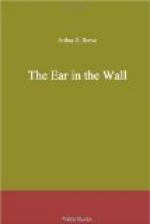It was with an unexpressed air of relief to several members of the party that Miss Ashton at last rapped for order and after a short, pithy, pointed speech of introduction presented the several speakers of the evening. It was, like the audience, a well-balanced programme, which showed the tactfulness and political acumen of Miss Ashton. I shall pass over the speeches, however, as they had no direct bearing on the mystery which Kennedy and I found so engrossing.
The meeting had been cleverly planned so that in spite of its accomplishing much for the propaganda work of the “cause,” it did not become tiresome and the speaking was followed by the entrance of one of the best little orchestras for dance music in the city.
Instantly, the scene transformed itself from a suffrage meeting to a social function that was unique. Leaders of the smart set rubbed elbows, and seemed to enjoy it, with working girls and agitators. Conservative and radical, millionaire and muckraker succumbed to the spell of the Ashton hospitality and the lure of the new dances. It was a novel experience for all, a levelling-up of society, as contrasted to some of the levelling-down that we had recently seen.
Kennedy and I, having no mood as things stood for the festivities, drew aside and watched the kaleidoscopic whirl of the dancers. Across from us was a wide doorway that opened into a spacious conservatory, a nook of tropical and temperate beauty. Several couples had wandered in there to rest and, as the orchestra struck up something new that seemed to have the “punch” to its timeful measures, they gradually rejoined the dancers.
It had evidently suggested an idea to Kennedy, for a moment later he led me toward the coat room and uncovered the package which he had brought consisting of the two oaken boxes I had seen him adjusting in the laboratory.
We managed to reach the conservatory and found in a corner a veritable bower with a wide rustic seat under some palms. Quickly Kennedy deposited in the shadow of one of them an oaken box, sticking into it the plugs on the ends of the wires that I had brought. It was an easy matter here in the dim half light to conceal the wire behind the plants and a moment later he tossed the end through a swinging window in the glass and closed the window.
Casually we edged our way out among the dancers and around to the room into which he had thrown the wire. It was a breakfast room, I think, but at any rate we could not remain there for it was quite easy to see into it through the crystal walls of the conservatory. There was, however, what seemed to be a little pantry at the other end, and to this Kennedy deftly led the wires and then plugged them in on the other oaken box.
He turned a lever. Instantly from the wizard-like little box issued forth the strains of the dance music of the orchestra and the rhythmic shuffle of feet. Now and then a merry laugh or a snatch of gay conversation floated in to us. Though we were effectually cut off from both sight and hearing in the pantry, it was as though we had been sitting on the rustic bench in the conservatory.




